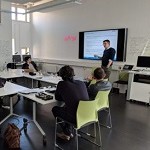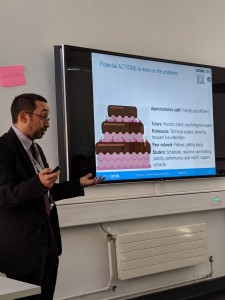Last week UNIR iTED participated in the second partners meeting of EduHack project at Coventry University

Daniel Burgos, director of the Research Institute for Innovation & Technology in Education (UNIR iTED), and Fabio Nascimbeni, researcher at UNIR iTED, contributed last week to the second partners meeting of the EduHack project in order to finalise the content and structure of the EduHack.eu course. The online course will both be available for self-learning as an Open Educational Resource and represent the preparatory phase for the project Hackathons, that will be organized on 2019 in Coventry, Madrid and Torino.
Co–located to the project meeting, Daniel Burgos participated in a workshop organized by Coventry University for their faculty, by presenting innovative views on how to tackle the attainment gap in online learning. As Burgos says, “the gap with the achievement of personal and institutional goals is a key factor for success. The right clustering of users (students and professor) and specific actions to every group, like Support Online Services, is a must in every winning strategy”.

Even with the emergence of Massively Online Open Courses (MOOCs) and other blended methodologies, teachers from Europe still don’t have skills such technical competence and knowledge of educational technologies or the ability to coordinate multi-disciplinary teams in the realisation of course-development activities. As Fabio Nascimbeni says, “we cannot keep training our teachers without considering the impact that open and networked technologies are having on our societies, on the contrary we need to adopt open, networked and collaborative approaches to empower a new generation of university educators”.
The project is led by the Nexa Centre of the Politecnico di Torino (Italy) in collaboration with the Universidad Internacional de La Rioja (Spain), Coventry University (UK), ATiT (Belgium) and the Knowledge Inonvation Centre (Malta).
Eva Ferreras
Unidad de Cultura Científica y de la Innovación (UCC+i)
